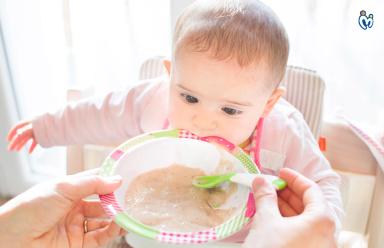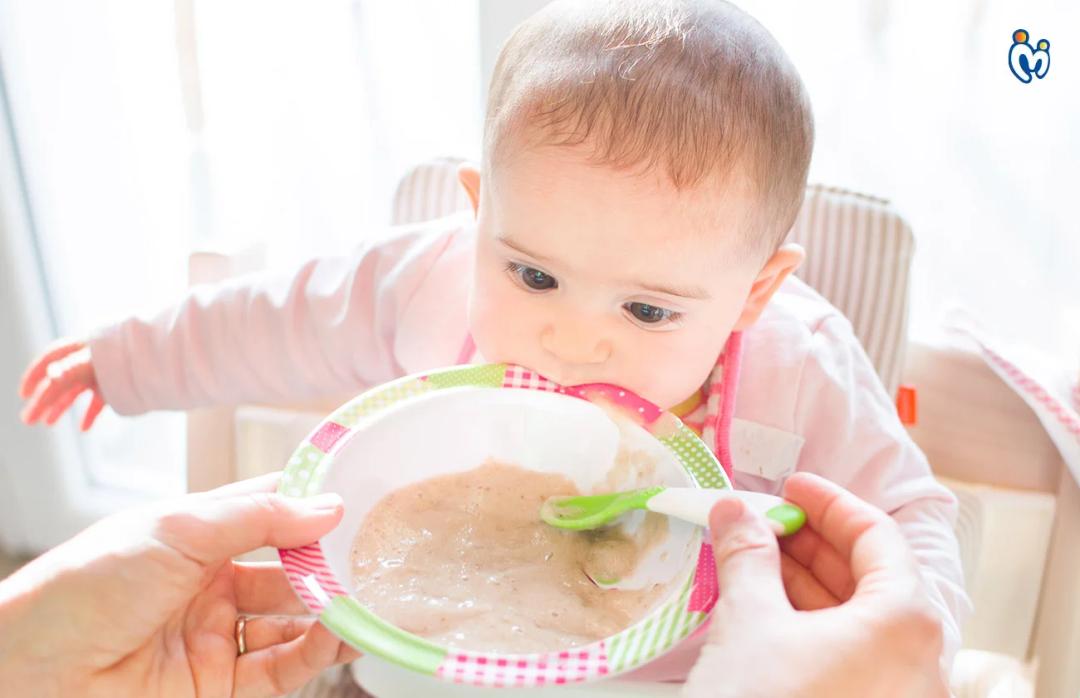Weaning is one of the most important phases in a child's growth phase. It is the stage where you introduce your child to food for the first time. Ever since the child is born, they are fed mother's milk only.
Weaning is a very slow process and does not happen overnight. It needs you to have patience and understanding. New mothers often have a tough time determining how to introduce their child to food and so on. In this article, we will be guiding you on how to start your child on solid food and all important points you must remember during the weaning phase.
Who is a weaning baby?
A weaning baby refers to a baby who will gradually be introduced to food and weaned away from breast milk. Apart from the mother's milk, they will be introduced to other foods as well. Parents must know what foods they should give their children during the growth phase.
Weaning is the first time you will be introducing solid food to your child's diet. It also refers to complementary feeding. Usually, the weaning process starts during the sixth month. By the sixth month, the baby gets all the necessary nutrients required for its growth from the mother's milk. The mother's milk provides them with sufficient nutrients that strengthens the immune system of the child and protects them from infection and illness.
Weaning is the first step towards the growth and development of children. It is one of the key features that determine your baby is now in the growing phase. If you are just starting to wean your baby, you need to ensure that they accept solid and liquid food.
What should you know about weaning?
If you are parents to newborn kids, it may be slightly difficult for you to determine what you should give to the weaning child. It is quite common to become nervous and anxious in such a stage. Well, here are some of the most important points that you must know about weaning.
1. What are the signs that your baby is ready to wean?
Until your child is six months, you must give only formula and breast milk to your children. Breastfeeding is a gradual process and so is weaning. Therefore, you need to keep a check on all the signs that determine your child is ready to wean.
Some of the common signs that indicate your child is ready to wean include:
- Holding the head upright
- Sitting independently with a back support
- Rolling over
- Sucking thumbs at night
- Hand-eye coordination movement
Your child will need to put in more effort for these actions. Therefore, it indicates that the energy of your child is increasing. Eventually, it also points that the appetite of the child is increasing.
Many babies may also experience a sudden increase in their appetite. This is mostly because of growth. However, if you notice any such situation, it does not mean that you should start the weaning process. Often the baby is likely to return to their normal state.
If the baby pushed food out of the mouth, it means that they aren't ready to swallow. If you are new and do not understand the process, you must consider visiting a paediatrician. They will help you determine if the child is ready for weaning or not.
2. When does the baby start to wean?
According to health professionals, a baby is ready to wean by the age of four to six months. If you are starting solid food for your children, you must consider administering it. Usually, parents must start giving solid food to children at the age of six months.
At the age of six months, the children may need extra nutrients that they cannot find in milk. By this age, the children will need extra nutrients such as zinc and iron. However, during this age, you can provide small amounts of solid food. It is quite rare to start the use of solid food for babies before the age of four months.
You must strictly refrain from starting solid foods before the child is ready.
3. What should the first taste of the child be?
Once your baby is ready for the weaning process, you must also know what the first taste of the child should be. First tastes are extremely important as it helps to develop good eating habits in children.
In the beginning, your child is likely to get all the nutrients from baby formula or breastmilk only.
When you are introducing solid food to your children, you must know that the amount they eat is less important than what they eat. As parents you must consider introducing new foods to them.
When you are introducing solid food to your children, you must consider making it a positive experience for the children. Apart from feeding, you must also allow the children to touch the food. Since it is the first time your child will be trying new food, you must consider mixing it with some breastmilk. Let them touch and taste new foods.
When you mix the food with breastmilk, your child can enjoy the delicious taste. Moreover, it will be a new experience for the children. This will help to bring about more acceptance.
Some of the common types of foods that you should introduce to your newborn include:
- Soft and overcooked vegetables: Carrot, Sweet Potato, Butternut squash, pumpkin- puree or mashed.
- Cereals- oatmeal, millet and quinoa- cooked, mashed or puree.
- Soft fruit- banana, avocado, cooked apple, plums, raspberries.
You can start off by giving them the mashed food using a baby spoon.You should give them in small quantities in the initial stages. After a few weeks, they will ask fo more on their own.. You can introduce a new food to your child every day. Allow them to understand the taste and swallow the fruit with water so that they can make themselves familiar.
Make mealtime fun by watching https://www.facebook.com/pokochanofficial/videos/989444598481524
4. Administer solid foods
After introducing soft foods, you should also introduce solid foods to your children. It is during the seventh or ninth month that you must introduce solid foods. You must consider providing these meals three times a day.
It is advisable that you keep a check on the texture of the food so that they can enjoy it. Make sure to know that your child is full. Given below are some of the solid foods that your child can try:
- Eggs
- Meat, poultry food
- Full-fat dairy products
- Nuts and seeds
- Pulses
- Gluten-containing foods
At the age of seven or nine months, the child will be ready to have three meals a day. Therefore, you can introduce these solid foods once or twice a day. At the age of eleven months, you can also introduce desserts for your children.
5. What food should you avoid?
Once your baby starts weaning, you must know what you should give them and what you should avoid. Some of the common foods that you must avoid in your children include the following:
- Undercooked eggs
- Honey
- Unpasteurized dairy products
- Low-fat products
- Whole nuts
- Cow's milk
- Junk food
- Sugar
Conclusion
Babies usually prefer sweet tastes. Therefore, when they are starting the weaning phase, you must keep a check on what the child is eating and what not. It is advisable that you provide them with a variety of foods. You must keep a check on what the child is eating and if there is any risk of food allergy. Start from four to six months and then you can keep a check on the progress as well. During the weaning phase, you must allow your children to make some mess so that they can become accepting.
Mamy Poko Pants will be your constant companion during the early years of your baby.
Use Mamy Poko baby wipes to clean your baby after meals. A cool and dry baby is a happy baby.
FAQ's
Q. What is weaning and why is it important?
Ans.Weaning is the gradual process of introducing solid foods to a baby while reducing breast milk or formula. It supports healthy growth by providing essential nutrients like iron and zinc, and helps babies develop chewing, swallowing, and eating habits essential for future nutrition and overall development.
Q. When should I start weaning my baby?
Ans.Experts recommend starting weaning between 4 to 6 months, with 6 months being ideal. At this age, babies need extra nutrients not found in milk alone. Look for readiness signs like sitting with support, head control, and interest in food before starting the process.
Q. What are signs that my baby is ready for weaning?
Ans.Signs include holding the head steady, sitting upright with support, showing interest in food, increased appetite, and better hand-eye coordination. If your baby pushes food out or struggles to swallow, they may not be ready yet. Always consult a pediatrician when in doubt.
Q. What should be my baby’s first foods?
Ans.Start with soft, mashed foods like overcooked vegetables (carrots, sweet potatoes), cereals (oatmeal, quinoa), and fruits (banana, avocado). Mix them with breast milk to enhance taste and acceptance. Introduce one food at a time and let your baby explore the texture and flavor gradually.
Q. How often should I feed solids to my baby initially?
Ans.In the beginning, feed solids once a day in small amounts. As your baby adapts, increase to two then three meals daily by 9 months. Offer food after milk feeds initially, and gradually shift toward establishing regular mealtimes with increasing variety and quantity.
Q. What solid foods can I introduce after soft foods?
Ans.From 7 to 9 months, introduce solids like eggs, pulses, poultry, full-fat dairy, nuts (in paste form), and gluten-containing foods. Offer mashed or chopped textures. These help build chewing skills and diversify nutrition. Monitor your baby's response and introduce new items gradually.
Q. What foods should be avoided during weaning?
Ans.Avoid honey, unpasteurized dairy, undercooked eggs, whole nuts, cow’s milk as a drink, and junk or sugary foods. These may pose allergy, choking, or digestion risks. Always offer age-appropriate, freshly prepared, and nutrient-rich meals to ensure safe and healthy weaning.
Q. How can I make weaning a positive experience?
Ans.Make weaning fun by allowing your baby to explore food with their hands. Sit together during mealtime, smile, and offer encouragement. Let your baby touch, smell, and taste different foods at their own pace. Keep the environment calm and stress-free for better acceptance.
Q. What should I do if my baby refuses new food?
Ans.It’s normal for babies to reject new foods. Keep offering the same food on different days without pressure. Try mixing it with familiar flavors like breast milk. Consistency and patience are key. Encourage play and exploration during feeding for better adaptation.
Q. Is mess during weaning normal?
Ans.Yes, making a mess is a healthy part of the weaning journey. It helps babies learn about textures and gain feeding independence. Use bibs and baby wipes like Mamy Poko to keep your baby clean. Messy mealtimes often lead to better acceptance and learning.
















